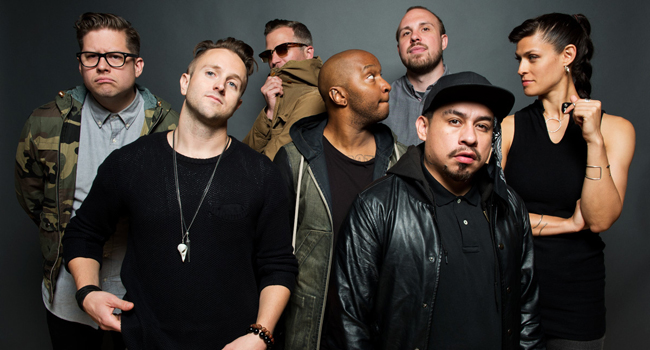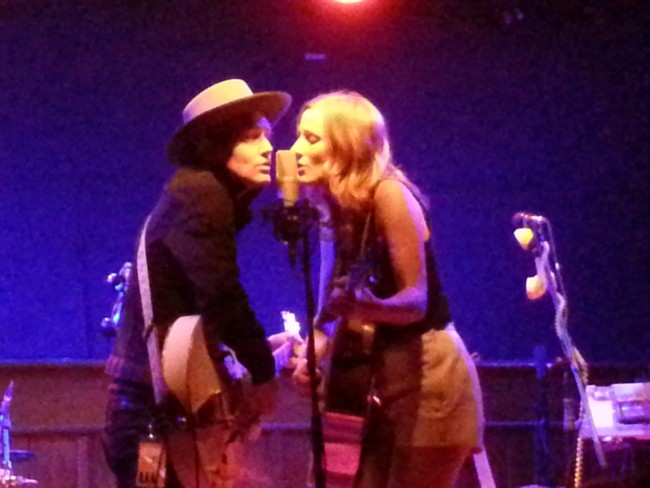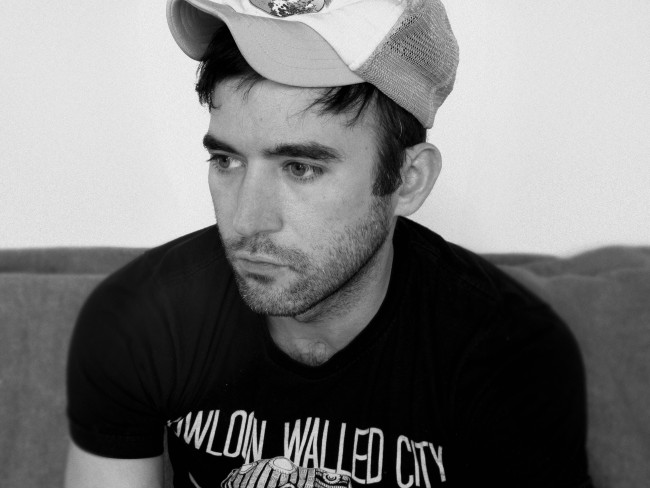The night promptly began with a quick set of Bastardgeist’s melancholic eclectronica. The Chicago duo—one half resembling a geek squad Moby DJ, the other a hipster club kid—was tensely arranged face-to-face, synth-to-synth, a 21st century satirical dueling pianos. Distorted hints of New Order prevailed in melancholic loops, and the faint vocals often veered off ambient mainland into detours of haunting falsettos. A brief bout of technical difficulties punctuated the set with an awkward hiccup, imparting an awkward anxiousness that characterized the half-hour set.
Brooklyn duo Beacon followed up the set with their discreet showmanship. As if his timid stage presence was not enough, lead vocalist Thomas Mullarney’s thick curtains of chestnut hair that hung in his face Cousin Itt-style continually drove a wedge between him and his audience. Sidekick Jacob Gossett’s passiveness complemented the disparity of Mullarney’s honey-coated vocals to Gossett’s melancholic melodies. A wrenching rendition of “See Through You,” a seductive, metallic jam that explodes with full-bodied backing vocals and rips of desperation, marked the most emotional moment of the set. Once the duo had cycled through choice cuts of their most recent EP “No Body,” they shuffled in “Safety’s Off” and ambient club jam “Feeling’s Gone.” Despite their emotional delivery and lyrics, Beacon’s lack of crowd interaction and painful focus made for a forgettable performance.
Wringing every drop of tension from the excitable audience, El Ten Eleven afforded the anxious audience with a generous wait leading up to the headlining set. This allotment gave the crowd ample time to ruminate over the meaning behind the grid of square, opalescent screens hovering in the background. The wait became even more tantalizing as platters of pedals were laid on the cramped stage in a mesmerizing tangle of black cables and glossy dials. Following a hypnotic collage of an apocalyptic breaking dawn and glittery constellations, the duo stalked onstage to yips of excitement.
The set began with epic 10-minute opener “Thanks Bill,” a nod to Alcoholics Anonymous founder Bill Wilson. From the cavernous hum of the resounding first note, the audience stood stalwartly as a collectively awestruck unit. The only movement prevailing throughout the stunned crowd was the buoyant head bobbing in the boundless sea of sound. The focus on the music was incredible.
Guitarist/bassist Kristian Dunn’s remarkable mastery of looping pedals crafted intricate layers of sound while Tim Fogarty’s percussion virtuosity lent an organic quality to the lengthy numbers. The California duo’s sound, remaining organic despite its machinist touches, remained hypnotic despite the long-winded set. Even without the stimulating dimension of vocals, the crowd never revealed so much as a tinge of boredom, a true testament to El Ten Eleven’s progressively nuanced sound.
A smattering of playful trills and bouncing strums left each composition fully developed and seemed to leave no uncharted musical territory. Despite this consistent execution, the duo still seemed to stumble into pockets of unexplored musicianship left to pioneer. Dunn’s guitar trickery, from funky bass slaps to a dramatic e-bow curls, lent an aggression to the often-hesitant instrumental genre.
“Yellow Bridges,” a single from the duo’s most recent album Transitions, featured sunny arpeggios coupled with melodic strums that showcased the duo’s self-control as much as their expert embellishments. The song, a nod to drummer Fogarty’s hometown of Pittsburgh, dialed into the personal narrative that El Ten Eleven’s music so movingly provides. The audience was transported to the song’s namesake thanks to the lattice of screens illustrating a car zooming beneath a canary yellow bridge.
A liberal dose of focus continued to be cast on Transitions’ seven atmospheric tracks. The album explores many personal themes including divorce, marriage, birth and moving to different cities, leaving the intimate venue’s air tinged with catharsis. The cyclical nature of life and love was fully realized in the delicate introductions that built into grand crescendos, eventually suspended in spellbinding grandiosity.
Dunn briefly swerved from original material in favor of an unexpected coupling of covers. A breathtaking rendition of “Disorder” by Joy Division flaunted the El Ten Eleven’s versatility by stamping the hauntingly detached track with their stamp of gripping inventiveness. The band continued this trajectory with an All Time Low cover, as well. While the crowd quickly recognized the subjects of these homages, it was delivered in a style that is uniquely El Ten Eleven—atmospheric, nuanced, and dynamic.
As the compositions continued to unfold and take flight in the electric air, Dunn’s showmanship enticed the audience. Dunn’s relentless supply of energy was mystifying as he scaled the stage with a lighthearted hop and became so engrossed in the music at one point that he accidentally kicked over his double-neck guitar.
Dunn fazed into “I Like Van Halen Because My Sister Says They Are Cool” at the stroke of midnight, doling out a magnificent inauguration to the new day. The unshakeable magnetism of the track—brief by El Ten Eleven’s standards, clocking in at just below four minutes—crafted itself into an incredibly profound opus as it exploded in intricacies. “In Transit,” a song that Dunn dubbed as their “hardest song to play,” owed to its constant key changes and array of time signatures, followed the crowd favorite. The 15-minute power play was beautifully complex and laid all of the duo’s expertise on the line.
El Ten Eleven’s imprint of spellbinding musicianship crafted a show as mystifying in its technicalities as it was in its beauty. The duo’s energy never waned, as they went balls to the wall of sound with each and every musical attack, determined to shove their compositions away from instrumental trivialities and clichés. El Ten Eleven explored every vein of musicianship so luminously that even the dull hum of static prevailed over the booming applause seemed tinged with beauty.



